短暂性动词与延续性动词详解,转换表及练习
短暂性动词和延续性动词
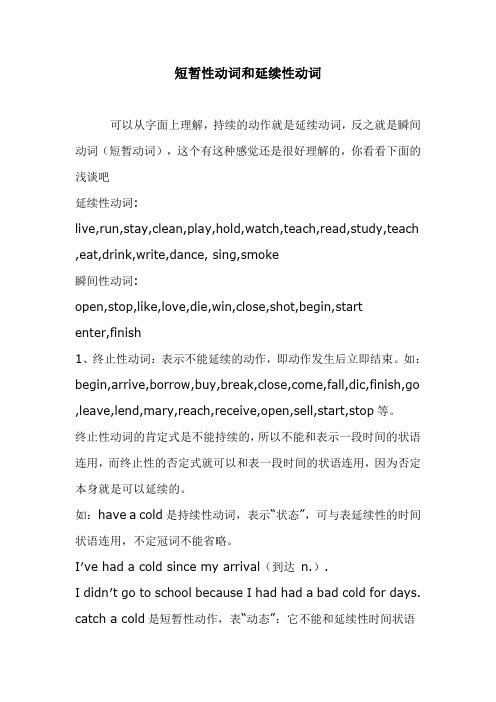
短暂性动词和延续性动词可以从字面上理解,持续的动作就是延续动词,反之就是瞬间动词(短暂动词),这个有这种感觉还是很好理解的,你看看下面的浅谈吧延续性动词:live,run,stay,clean,play,hold,watch,teach,read,study,teach ,eat,drink,write,dance, sing,smoke瞬间性动词:open,stop,like,love,die,win,close,shot,begin,startenter,finish1、终止性动词:表示不能延续的动作,即动作发生后立即结束。
如:begin,arrive,borrow,buy,break,close,come,fall,dic,finish,go ,leave,lend,mary,reach,receive,open,sell,start,stop等。
终止性动词的肯定式是不能持续的,所以不能和表示一段时间的状语连用,而终止性的否定式就可以和表一段时间的状语连用,因为否定本身就是可以延续的。
如:have a cold是持续性动词,表示“状态”,可与表延续性的时间状语连用,不定冠词不能省略。
I′ve had a cold since my arrival(到达n.).I didn′t go to school because I had had a bad cold for days. catch a cold是短暂性动作,表“动态”:它不能和延续性时间状语连用,不定冠词“a”可有可无,catch可用take,get代替。
Put on your coat,or you′ll catch/take/get a cold.Take care not to get cold.但是,若cold前有形容词修饰时,则不定冠词不能省。
如:Brown has taken a slight cold.注意下列句子:I have caught a cold for over a week.(×)I have had a cold for over a week.( )2、延续性动词:表示可以延续一段时间的动作或状态。
常用短暂性动词与延续性动词及其例句
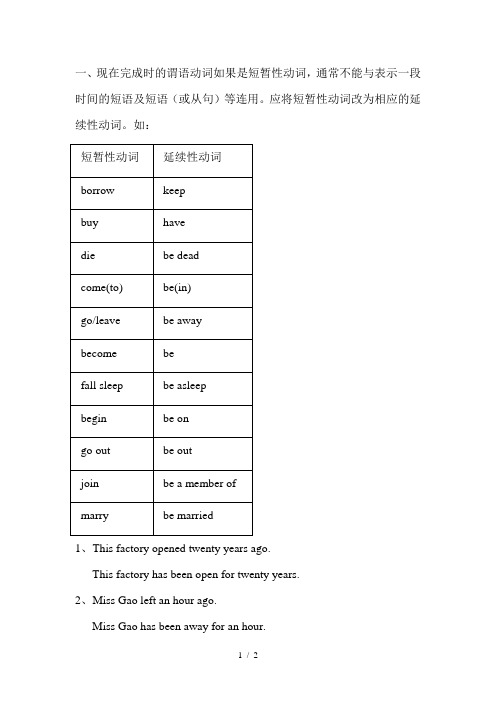
一、现在完成时的谓语动词如果是短暂性动词,通常不能与表示一段时间的短语及短语(或从句)等连用。
应将短暂性动词改为相应的延续性动词。
如:1、This factory opened twenty years ago.This factory has been open for twenty years.2、Miss Gao left an hour ago.Miss Gao has been away for an hour.3、Her teacher has been a Party member for 3 years.Her teacher joined the Party 3 years ago.4、The film began two minutes ago.The film has been on since two minutes ago.5、He bought the bike two years ago.He has had the bike for two years.6、The old man died ten years ago.The old man has been dead for ten years.7、He came back 3 days ago.He has been back for 3 days.8、I left my hometown 10 years ago.I have been away from my hometown for 10 years.9、They got married 13 year ago.They have been married for 13 years.10、I borrowed the book a week ago.I have kept the book for a week.How long have you kept the book?注:在否定句中,短暂性动词可以和表示一段时间的状语连用。
现在完成时中短暂性动词变延续性动词归纳表
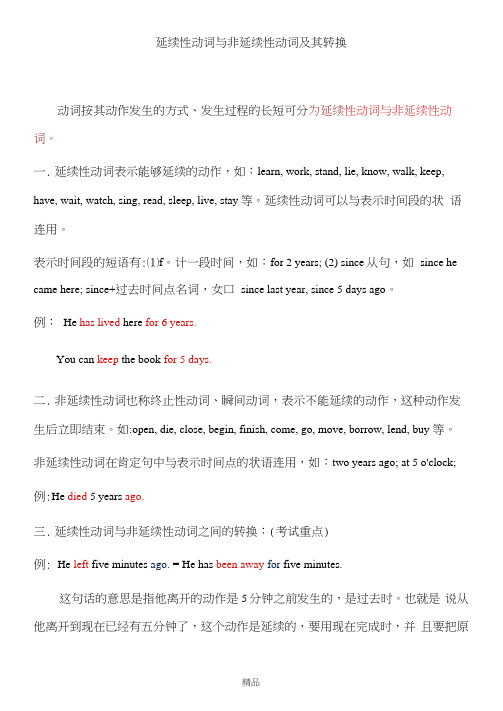
延续性动词与非延续性动词及其转换动词按其动作发生的方式、发生过程的长短可分为延续性动词与非延续性动词。
一.延续性动词表示能够延续的动作,如:learn, work, stand, lie, know, walk, keep, have, wait, watch, sing, read, sleep, live, stay等。
延续性动词可以与表示时间段的状语连用。
表示时间段的短语有:⑴f。
计一段时间,如:for 2 years; (2) since从句,如since he came here; since+过去时间点名词,女口since last year, since 5 days ago。
例:He has lived here for 6 years.You can keep the book for 5 days.二.非延续性动词也称终止性动词、瞬间动词,表示不能延续的动作,这种动作发生后立即结束。
如:open, die, close, begin, finish, come, go, move, borrow, lend, buy 等。
非延续性动词在肯定句中与表示时间点的状语连用,如:two years ago; at 5 o'clock; 例:He died 5 years ago.三.延续性动词与非延续性动词之间的转换:(考试重点)例: He left five minutes ago. = He has been away for five minutes.这句话的意思是指他离开的动作是5分钟之前发生的,是过去时。
也就是说从他离开到现在已经有五分钟了,这个动作是延续的,要用现在完成时,并且要把原来的短暂性动词改为延续性动词。
一些短暂性动词及相应的延续性动词:arrive (get to /reach) —* be here 0n) begin(start) —> be on die —> be dead come here (back) —be here (back) leave —> be away (from)fall ill(sick, asleep)—>be ill(sick^ asleep) get up—> be up go/ get out (there) —> be out (there) finish f be over put on —> wear 或be onopen —> be open (keep sth. open)join —> be in 或be a member of・••+组织机构close f be closed go to school —> be a student borrow —>keep buy/get —>have catch(a cold) t have(a cold) get to know —> know begjn to study —> study come to work —> work move to —> live in finish —> be over come to —> be in sit down —> be seated marry —> be married dress f be dressed become —> be如有侵权请联系告知删除,感谢你们的配合!。
延续性动词和短暂性动词

例子
学习
需要一段时间来掌握知识和技能 。
工作
通常指一段时间内从事某种职业或 任务。
等待
表示在一段时间内保持某种状态或 期望某事发生。
与短暂性动词的区别
短暂性动词表示的动作或状态持续时 间较短,如“看”、“听”、“摸” 等。
例如,“看”是一个短暂性动词,表 示瞬间完成的动作,而“学习”是一 个延续性动词,表示需要一段时间来 完成的动作。
延续性动词和短暂 性动词
contents
目录
• 延续性动词 • 短暂性动词 • 延续性动词和短暂性动词的使用场景 • 延续性动词和短暂性动词的转换 • 练习与巩固
01
CATALOGUE
延续性动词
定义
01
延续性动词表示的动作或状态持 续时间较长,如“学习”、“工 作”、“等待”等。
02
延续性动词强调动作或状态在一 段时间内的持续性,而不是瞬间 的完成。
延续性动词转换为短暂性动词
睡觉:醒来
抽烟:抽一口 写作:写完
学习:学会 游泳:游过
延续性动词转换为短暂性动词
开车:开一下
唱歌:唱一段
01
02
03
看书:看一眼
喝咖啡:喝一口
04
05
穿衣服:穿一下
短暂性动词转换为延续性动词
离开:逗留 来/去:停留在
结婚:与某人相处
短暂性动词转换为延续性动词
死亡:生活过 到达:在某地待一段时间
示例
我喜欢(看/看过)电影。在这个句子 中,正确的动词形式是“看”,因为 它是一个表示动作的延续性动词。
造句练习
造句练习
根据给定的主题或提示,使用正确的动词形式造句。
示例
短暂动词对应延续性动词变化
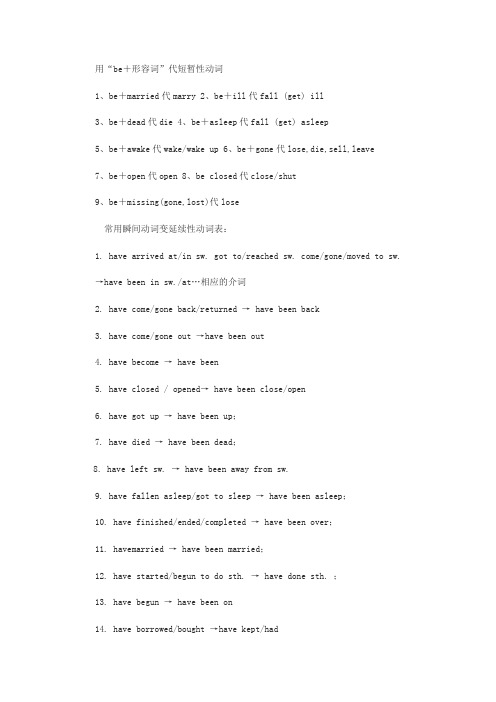
用“be+形容词”代短暂性动词1、be+married代marry2、be+ill代fall (get) ill3、be+dead代die4、be+asleep代fall (get) asleep5、be+awake代wake/wake up6、be+gone代lose,die,sell,leave7、be+open代open 8、be closed代close/shut9、be+missing(gone,lost)代lose常用瞬间动词变延续性动词表:1. have arrived at/in sw. got to/reached sw. come/gone/moved to sw. →have been in sw./at…相应的介词2. have come/gone back/returned → have been back3. have come/gone out →have been out4. have become → have been5. have closed / opened→ have been close/open6. have got up → have been up;7. have died → have been dead;8. have left sw. → have been away from sw.9. have fallen asleep/got to sleep → have been asleep;10. have finished/ended/completed → have been over;11. havemarried → have been married;12. have started/begun to do sth. → have done sth. ;13. have begun → have been on14. have borrowed/bought →have kept/had15. have lost → haven’t had16. have put on →have worn17. have caught /get a cold → have had a cold;18. have got to know → have known19. have/has gone to → have been in20. have joined/have taken part in the league/the Party/the army延续性动词与非延续性动词之间的转换:leave --- be away, borrow --- keep, buy --- have, begin/start --- be on, die --- be dead, finish --- beover, join --- be in+组织机构, be a member of+组织机构, open sth --- keep sth open, fall ill --- be ill, get up---be up, catch a cold ---have a cold, come here --- be here, go there --- be there, become--- be, come back --- be back, fall asleep --- be asleep, getto/ arrive/reach --- be (in), leave --- be away from, get to know--- know, go (get) out →be out,put on→ wear;catch a cold →have acold。
短暂性动词与延续性动词详解-转换表及练习(汇编)
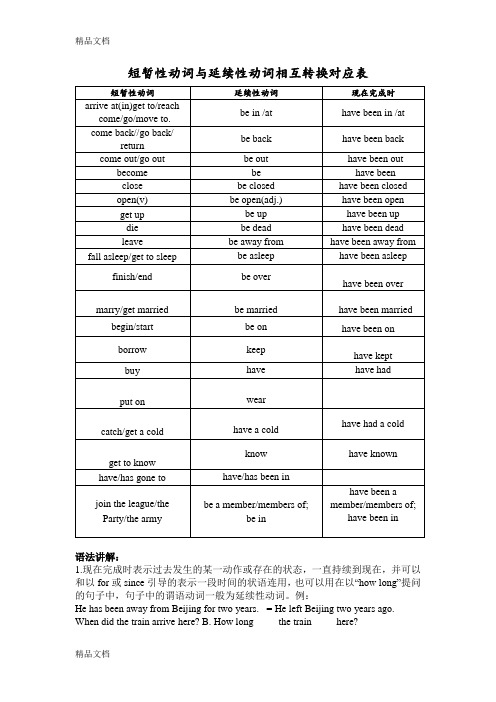
短暂性动词与延续性动词相互转换对应表短暂性动词延续性动词现在完成时arrive at(in)get to/reachcome/go/move to.be in /at have been in /at come back//go back/returnbe back have been back come out/go out be out have been out become be have beenclose be closed have been closedopen(v) be open(adj.) have been openget up be up have been updie be dead have been deadleave be away from have been away from fall asleep/get to sleep be asleep have been asleepfinish/end be overhave been over marry/get married be married have been married begin/start be on have been onborrow keephave kept buy have have hadput on wearcatch/get a cold have a coldhave had a cold get to knowknow have known have/has gone to have/has been injoin the league/the Party/the army be a member/members of;be inhave been amember/members of;have been in语法讲解:1.现在完成时表示过去发生的某一动作或存在的状态,一直持续到现在,并可以和以 for或since引导的表示一段时间的状语连用,也可以用在以“how long”提问的句子中,句子中的谓语动词一般为延续性动词。
短暂性动词和延续性动词
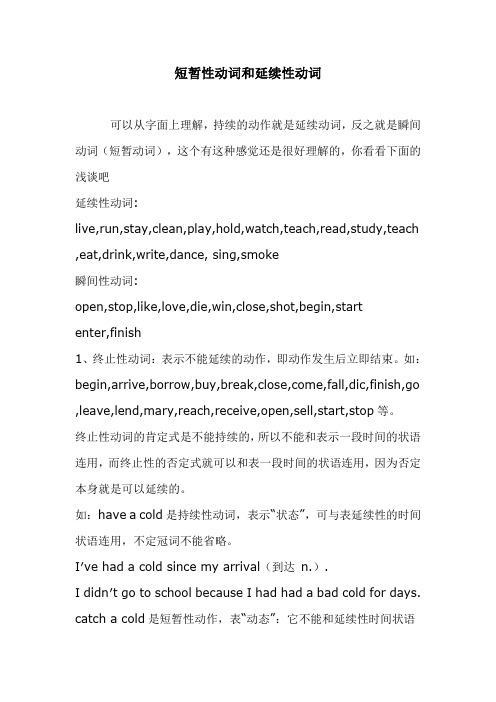
短暂性动词和延续性动词可以从字面上理解,持续的动作就是延续动词,反之就是瞬间动词(短暂动词),这个有这种感觉还是很好理解的,你看看下面的浅谈吧延续性动词:live,run,stay,clean,play,hold,watch,teach,read,study,teach ,eat,drink,write,dance, sing,smoke瞬间性动词:open,stop,like,love,die,win,close,shot,begin,startenter,finish1、终止性动词:表示不能延续的动作,即动作发生后立即结束。
如:begin,arrive,borrow,buy,break,close,come,fall,dic,finish,go ,leave,lend,mary,reach,receive,open,sell,start,stop等。
终止性动词的肯定式是不能持续的,所以不能和表示一段时间的状语连用,而终止性的否定式就可以和表一段时间的状语连用,因为否定本身就是可以延续的。
如:have a cold是持续性动词,表示“状态”,可与表延续性的时间状语连用,不定冠词不能省略。
I′ve had a cold since my arrival(到达n.).I didn′t go to school because I had had a bad cold for days. catch a cold是短暂性动作,表“动态”:它不能和延续性时间状语连用,不定冠词“a”可有可无,catch可用take,get代替。
Put on your coat,or you′ll catch/take/get a cold.Take care not to get cold.但是,若cold前有形容词修饰时,则不定冠词不能省。
如:Brown has taken a slight cold.注意下列句子:I have caught a cold for over a week.(×)I have had a cold for over a week.( )2、延续性动词:表示可以延续一段时间的动作或状态。
短暂性动词与延续性动词语法讲解
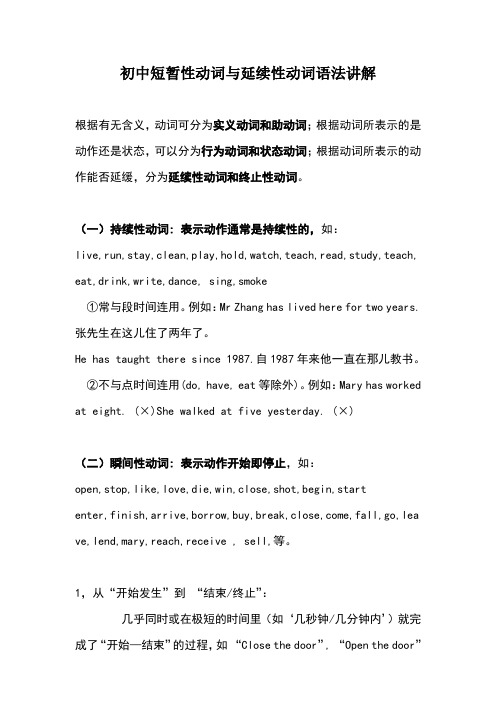
初中短暂性动词与延续性动词语法讲解根据有无含义,动词可分为实义动词和助动词;根据动词所表示的是动作还是状态,可以分为行为动词和状态动词;根据动词所表示的动作能否延缓,分为延续性动词和终止性动词。
(一)持续性动词: 表示动作通常是持续性的,如:live,run,stay,clean,play,hold,watch,teach,read,study,teach, eat,drink,write,dance, sing,smoke①常与段时间连用。
例如:Mr Zhang has lived here for two years.张先生在这儿住了两年了。
He has taught there since 1987.自1987年来他一直在那儿教书。
②不与点时间连用(do, have, eat等除外)。
例如:Mary has worked at eight. (×)She walked at five yesterday. (×)(二)瞬间性动词: 表示动作开始即停止,如:open,stop,like,love,die,win,close,shot,begin,startenter,finish,arrive,borrow,buy,break,close,come,fall,go,lea ve,lend,mary,reach,receive , sell,等。
1,从“开始发生”到“结束/终止”:几乎同时或在极短的时间里(如‘几秒钟/几分钟内’)就完成了“开始—结束”的过程,如“Close the door”, “Open the door”2,有些瞬间动词的“开始—结束的过程”可能稍微长一些,但也不会很长的,如,“buy sth(买下)”:付了款、拿了发票即完成了。
所以,“我买了这块手表5年了”,在汉语中说的通,但英语的表达就不能说:I have bought the watch for five years.buy sth ---- have sth (拥有)---have/has + had sth for…A: I have had the watch for 5 years.B: It is (has been) five years since I bought the watch. C: I bought it 5 years ago.同理,“borrow sth”“借书”在办理了相关的‘登记’手续后就结束了,不可能“借”几个星期或好几年的!汉语“这本书我已经借用了2星期了。
现在完成时中短暂性动词变延续性动词归纳表
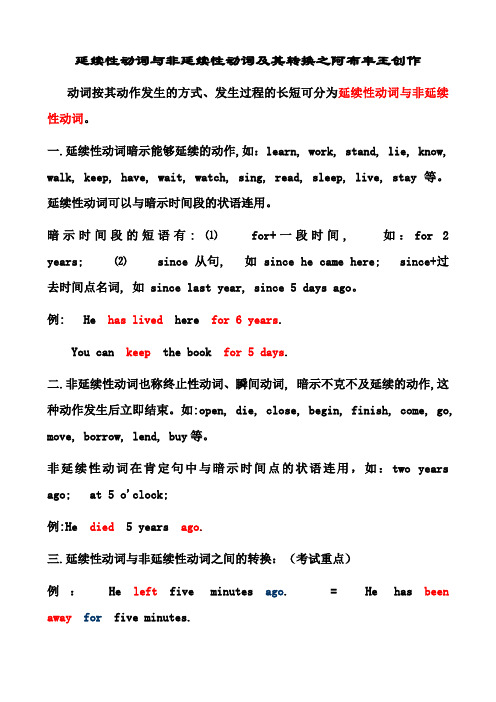
延续性动词与非延续性动词及其转换之阿布丰王创作动词按其动作发生的方式、发生过程的长短可分为延续性动词与非延续性动词。
一.延续性动词暗示能够延续的动作,如:learn, work, stand, lie, know, walk, keep, have, wait, watch, sing, read, sleep, live, stay等。
延续性动词可以与暗示时间段的状语连用。
暗示时间段的短语有: ⑴for+一段时间, 如:for 2 years; ⑵ since从句, 如 since he came here; since+过去时间点名词, 如 since last year, since 5 days ago。
例: He has lived here for 6 years.You can keep the book for 5 days.二.非延续性动词也称终止性动词、瞬间动词, 暗示不克不及延续的动作,这种动作发生后立即结束。
如:open, die, close, begin, finish, come, go, move, borrow, lend, buy等。
非延续性动词在肯定句中与暗示时间点的状语连用,如:two years ago; at 5 o'clock;例:He died 5 years ago.三.延续性动词与非延续性动词之间的转换:(考试重点)例:He left five minutes ago. = He has been away for five minutes.这句话的意思是指他离开的动作是5分钟之前发生的,是过去时。
也就是说从他离开到现在已经有五分钟了,这个动作是延续的,要用现在完成时,而且要把原来的短暂性动词改为延续性动词。
一些短暂性动词及相应的延续性动词:arrive(get to /reach)→be here (in)begin(start)→be ondie →be deadcomehere(back)→be here(back)leave →be away (from)fall ill(sick, asleep)→be ill(sick, asleep)get up→be upgo/ get out(there)→be out(there)finish →be overput o n →wear 或be onopen →be open(keep sth. open)join →be in或be a member of…+组织机构close →be closedgo to school→be a studentborrow →keepbuy/get →havecatch(a cold)→ have(a cold)get to know →knowbegin to study→studycome to work→work move to → live in finish→ be over come to → be insit down → be seated marry → be married dress → be dressed become → be。
中考英语短暂性动词与延续性动词相互转换讲练
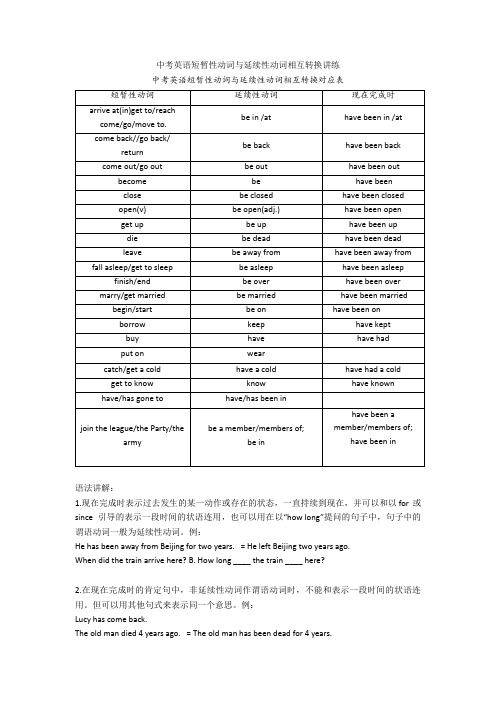
中考英语短暂性动词与延续性动词相互转换讲练中考英语短暂性动词与延续性动词相互转换对应表语法讲解:1.现在完成时表示过去发生的某一动作或存在的状态,一直持续到现在,并可以和以 for或since引导的表示一段时间的状语连用,也可以用在以“how long”提问的句子中,句子中的谓语动词一般为延续性动词。
例:He has been away from Beijing for two years. = He left Beijing two years ago.When did the train arrive here? B. How long ____ the train ____ here?2.在现在完成时的肯定句中,非延续性动词作谓语动词时,不能和表示一段时间的状语连用。
但可以用其他句式来表示同一个意思。
例:Lucy has come back.The old man died 4 years ago. = The old man has been dead for 4 years.He has been away from Beijing for two years.= He left Beijing two years ago.= It is two years since he left Beijing.= Two years has passed since he left Beijing.3.非延续性动词可以在现在完成时的否定句中作谓语,并可以与for,since引导的时间状语连用,表示动作的延续过程。
例如:She h asn’t bought any new clothes since last year.I haven’t borrowed the book for a long time.巩固习题:1. When he arrived at the bus stop, the bus ________ for 20 minutes.A. has leftB. had leftC. has been awayD. had been away2. I ______ the League for 5 years so far.A. joinedB. have joinedC. have been in3. The factory ________ since the February of 1988.A . has been open B. has opened C. was open D. opened4. Mary and Rose _______friends since they met in 2000.A. have madeB. have beenC. madeD. have become5.The meeting _______ for a week now.A. has finishedB. has endedC. has been over6.Miss Gao ______ this school for nearly 5 years.A. has been inB. has come toC. has taught7.Ben ______ a teacher for 4 years .A. has beenB. has becomeC. wasD. became8. I ______ home for a week.A. have returnedB. have been backC. returned9. How long _______ he ________ ?A. diedB. has, diedC. has, been dead10. ----- How long can I ______ the book? ------ Two weeks.A. borrowB. lendC. getD. keep11.He ________ the car for a week.A. boughtB. has boughtC. has had12.-----How long _____ you _____ ill ? -----Two weeks.A. did fallB. have, fellC. have, been13.Since 2000, he _____ his hometown.A. has leftB. has moved awayC. has been away from14.I'll lend you the book , but you can only _____ it for 2 days.A. borrowB. keepC. take15.The bus ______ on the road for 2 hours so far.A. has stoppedB. stoppedC. has been16. Tom is ill in hospital. He _______ a cold for several days.A. isB. catchesC. has caughtD. has had17.He ________ for 2 hours.A. got upB. has got upC. has been up二、英语书面表达专项训练2.亚洲文明对话大会近期在北京召开,你的印度朋友Danny收看了大会相关报道,对华夏文明产生了浓厚的兴趣,来信向你了解中国文化。
短暂性动词与延续性动词语法讲解
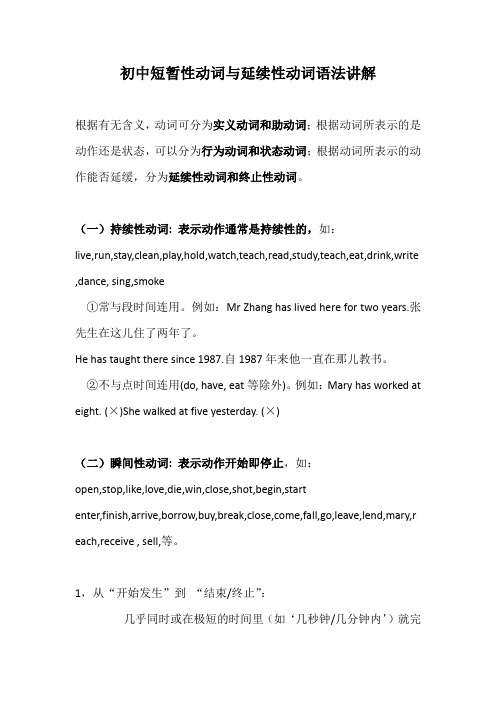
初中短暂性动词与延续性动词语法讲解根据有无含义,动词可分为实义动词和助动词;根据动词所表示的是动作还是状态,可以分为行为动词和状态动词;根据动词所表示的动作能否延缓,分为延续性动词和终止性动词。
(一)持续性动词: 表示动作通常是持续性的,如:live,run,stay,clean,play,hold,watch,teach,read,study,teach,eat,drink,write ,dance, sing,smoke①常与段时间连用。
例如:Mr Zhang has lived here for two years.张先生在这儿住了两年了。
He has taught there since 1987.自1987年来他一直在那儿教书。
②不与点时间连用(do, have, eat等除外)。
例如:Mary has worked at eight. (×)She walked at five yesterday. (×)(二)瞬间性动词: 表示动作开始即停止,如:open,stop,like,love,die,win,close,shot,begin,startenter,finish,arrive,borrow,buy,break,close,come,fall,go,leave,lend,mary,r each,receive , sell,等。
1,从“开始发生”到“结束/终止”:几乎同时或在极短的时间里(如‘几秒钟/几分钟内’)就完成了“开始—结束”的过程,如“Close the door”, “Open the door”2,有些瞬间动词的“开始—结束的过程”可能稍微长一些,但也不会很长的,如,“buy sth(买下)”:付了款、拿了发票即完成了。
所以,“我买了这块手表5年了”,在汉语中说的通,但英语的表达就不能说:I have bought the watch for five years.buy sth ---- have sth (拥有)---have/has + had sth for…A: I have had the watch for 5 years.B: It is (has been) five years since I bought the watch.C: I bought it 5 years ago.同理,“borrow sth”“借书”在办理了相关的‘登记’手续后就结束了,不可能“借”几个星期或好几年的!汉语“这本书我已经借用了2星期了。
短暂性动词与延续性动词详解转换表及练习(终审稿)

短暂性动词与延续性动词详解转换表及练习文稿归稿存档编号:[KKUY-KKIO69-OTM243-OLUI129-G00I-FDQS58-短暂性动词与延续性动词相互转换对应表语法讲解:1.现在完成时表示过去发生的某一动作或存在的状态,一直持续到现在,并可以和以?for或since引导的表示一段时间的状语连用,也可以用在以“how?long”提问的句子中,句子中的谓语动词一般为延续性动词。
例:HehasbeenawayfromBeijingfortwoyears.=HeleftBeijingtwoyearsago. WhendidthetrainarrivehereB.Howlong____thetrain____here2.在现在完成时的肯定句中,非延续性动词作谓语动词时,不能和表示一段时间的状语连用。
但可以用其他句式来表示同一个意思。
例:Lucyhascomeback.Theoldmandied4yearsago.=Theoldmanhasbeendeadfor4years. HehasbeenawayfromBeijingfortwoyears.=HeleftBeijingtwoyearsago.=ItistwoyearssinceheleftBeijing.=TwoyearshaspassedsinceheleftBeijing.3.非延续性动词可以在现在完成时的否定句中作谓语,并可以与for,since引导的时间状语连用,表示动作的延续过程。
例如:Shehasn’tboughtanynewclothessincelastyear.I?haven’tborrowedthebo okforalongtime.巩固习题:1.Whenhearrivedatthebusstop,thebus________for20minutes.A.hasleftB.hadleftC.hasbeenawayD.hadbeenaway2.I______theLeaguefor5yearssofar.A.joinedB.havejoinedC.havebeenin3.Thefactory________sincetheFebruaryof1988.A.hasbeenopenB.hasopenedC.wasopenD.opened4.MaryandRose_______friendssincetheymetin2000.A.havemadeB.havebeenC.madeD.havebecome5.Themeeting_______foraweeknow.A.hasfinishedB.hasendedC.hasbeenover6.MissGao______thisschoolfornearly5years.A.hasbeeninB.hascometoC.hastaught7.Ben______ateacherfor4years.A.hasbeenB.hasbecomeC.wasD.became8.I______homeforaweek.A.havereturnedB.havebeenbackC.returned9.Howlong_______he________A.diedB.has,diedC.has,beendead10.-----HowlongcanI______thebook------Twoweeks.A.borrowB.lendC.getD.keep11.He________thecarforaweek.A.boughtB.hasboughtC.hashad12.-----Howlong_____you_____ill-----Twoweeks.A.didfallB.have,fellC.have,been13.Since2000,he_____hishometown.A.hasleftB.hasmovedawayC.hasbeenawayfrom14.I'lllendyouthebook,butyoucanonly_____itfor2days.A.borrowB.keepC.take15.Thebus______ontheroadfor2hourssofar.A.hasstoppedB.stoppedC.hasbeen16.Tomisillinhospital.He_______acoldforseveraldays.A.isB.catchesC.hascaughtD.hashad17.He________for2hours.A.gotupB.hasgotupC.hasbeenup。
初中英语短暂性动词如何变成延续性动词

典例
他参军2年。1.He joined the army(部队)two
years ago. 2.He has been in the army for two years. = since two years ago. 3.He has been a soldier for two years. 4.It is 2 years since he joined the army. It has been 2 years since he joined the army. 5.2 years has passed since he joined the army.
记住下面典例
他入党20年。1.He joined the Party 20 ቤተ መጻሕፍቲ ባይዱears ago.
2.He has been in the Party for 20 years. = since 20 years ago. 3.He has been a Party member for 20 years. 4.It is 20 years since he joined the Party. =It has been 20 years since he joined the Party. 5.20 years has passed since he joined the Party.
buy→have had borrow/lend→keep become→have been catch/get a cold→have had a cold put on→have worn marry→have been married fall/get ill→have been ill die→have been dead
延续性动词和短暂性动词转换归纳
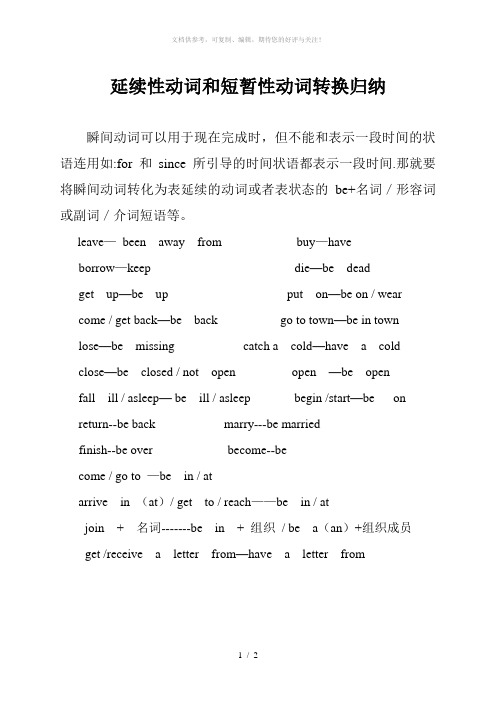
延续性动词和短暂性动词转换归纳瞬间动词可以用于现在完成时,但不能和表示一段时间的状语连用如:for 和since 所引导的时间状语都表示一段时间.那就要将瞬间动词转化为表延续的动词或者表状态的be+名词/形容词或副词/介词短语等。
leave—been away from buy—haveborrow—keep die—be deadget up—be up put on—be on / wearcome / get back—be back go to town—be in townlose—be missing catch a cold—have a coldclose—be closed / not open open —be openfall ill / asleep— be ill / asleep begin /start—be onreturn--be back marry---be marriedfinish--be over become--become / go to —be in / atarrive in (at)/ get to / reach——be in / atjoin + 名词-------be in + 组织/ be a(an)+组织成员get /receive a letter from—have a letter from一看时间状语。
如果句中没有表示过去确切时间的状语,常用现在完成时;如果有,则只能用一般过去时。
如:I have visited the factory.I visited the factory last year.二看句首有无疑问词。
如果笼统地问人家做过某事了吗(句首无疑问词),常用现在完成时;但进一步询问何时、何地、何原因、用什么方式做那事时(句首有疑问词)就要用一般过去时。
如:-Have you had your breakfast? -Yes, I have.-When did you have it? -At seven thirty.注意:这种用法是以连贯性问答为背景的。
短暂性动词与延续性动词详解,转换表及练习
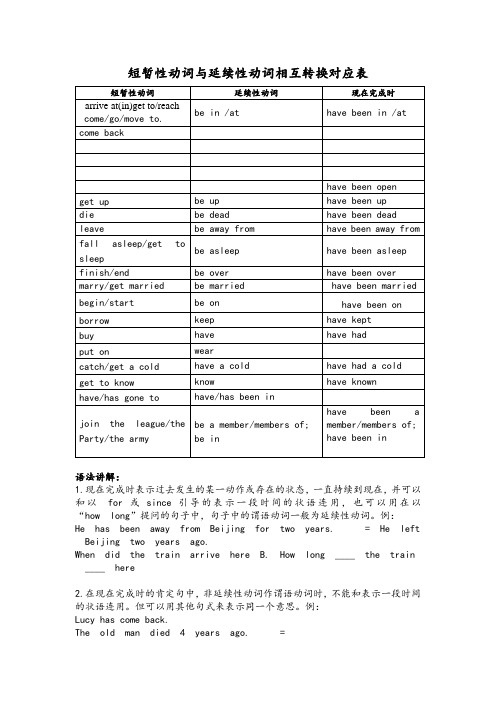
短暂性动词与延续性动词相互转换对应表语法讲解:1.现在完成时表示过去发生的某一动作或存在的状态,一直持续到现在,并可以和以for或since引导的表示一段时间的状语连用,也可以用在以“how long”提问的句子中,句子中的谓语动词一般为延续性动词。
例:He has been away from Beijing for two years. = He left Beijing two years ago.When did the train arrive here B. How long ____ the train ____ here2.在现在完成时的肯定句中,非延续性动词作谓语动词时,不能和表示一段时间的状语连用。
但可以用其他句式来表示同一个意思。
例:Lucy has come back.The old man died 4 years ago. =The old man has been dead for 4 years.He has been away from Beijing for two years.= He left Beijing two years ago.= It is two years since he left Beijing.= Two years has passed since he left Beijing.3.非延续性动词可以在现在完成时的否定句中作谓语,并可以与for,since引导的时间状语连用,表示动作的延续过程。
例如:She hasn’t bought any new clothes since last year.I haven’t borrowed the book for a long time.巩固习题:1. When he arrived at the bus stop, the bus ________ f or 20 minutes.A. has leftB. had leftC. has been awayD. had been away2. I ______ the League for 5 years so far.A. joinedB. have joinedC. have been in3. The factory ________ since the February of 1988.A . has been open B. has opened C. was open D. opened4. Mary and Rose _______friends since they met in 2000.A. have madeB. have beenC. madeD. have becomemeeting _______ for a week now.A. has finishedB. has endedC. has been overGao ______ this school for nearly 5 years.A. has been inB. has come toC. has taught______ a teacher for 4 years .A. has beenB. has becomeC. wasD. became8. I ______ home for a week.A. have returnedB. have been backC. returned9. How long _______ he ________A. diedB. has, diedC. has, been dead10. ----- How long can I ______ the book ------ Two weeks.A. borrowB. lendC. getD. keep________ the car for a week.A. boughtB. has boughtC. has hadlong _____ you _____ ill -----Two weeks.A. did fallB. have, fellC. have, been2000, he _____ his hometown.A. has leftB. has moved awayC. has been away from'll lend you the book , but you can only _____ it for 2 days.A. borrowB. keepC. takebus ______ on the road for 2 hours so far.A. has stoppedB. stoppedC. has been16. Tom is ill in hospital. He _______ a cold for several days.A. isB. catchesC. has caughtD. has ha d________ for 2 hours.A. got upB. has got upC. has been up。
中考英语短暂性动词与延续性动词相互转换讲练 (4)
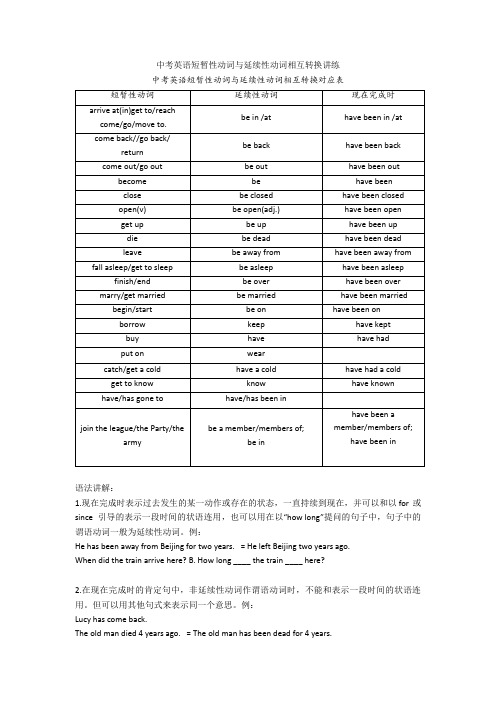
中考英语短暂性动词与延续性动词相互转换讲练中考英语短暂性动词与延续性动词相互转换对应表语法讲解:1.现在完成时表示过去发生的某一动作或存在的状态,一直持续到现在,并可以和以 for或since引导的表示一段时间的状语连用,也可以用在以“how long”提问的句子中,句子中的谓语动词一般为延续性动词。
例:He has been away from Beijing for two years. = He left Beijing two years ago.When did the train arrive here? B. How long ____ the train ____ here?2.在现在完成时的肯定句中,非延续性动词作谓语动词时,不能和表示一段时间的状语连用。
但可以用其他句式来表示同一个意思。
例:Lucy has come back.The old man died 4 years ago. = The old man has been dead for 4 years.He has been away from Beijing for two years.= He left Beijing two years ago.= It is two years since he left Beijing.= Two years has passed since he left Beijing.3.非延续性动词可以在现在完成时的否定句中作谓语,并可以与for,since引导的时间状语连用,表示动作的延续过程。
例如:She h asn’t bought any new clothes since last year.I haven’t borrowed the book for a long time.巩固习题:1. When he arrived at the bus stop, the bus ________ for 20 minutes.A. has leftB. had leftC. has been awayD. had been away2. I ______ the League for 5 years so far.A. joinedB. have joinedC. have been in3. The factory ________ since the February of 1988.A . has been open B. has opened C. was open D. opened4. Mary and Rose _______friends since they met in 2000.A. have madeB. have beenC. madeD. have become5.The meeting _______ for a week now.A. has finishedB. has endedC. has been over6.Miss Gao ______ this school for nearly 5 years.A. has been inB. has come toC. has taught7.Ben ______ a teacher for 4 years .A. has beenB. has becomeC. wasD. became8. I ______ home for a week.A. have returnedB. have been backC. returned9. How long _______ he ________ ?A. diedB. has, diedC. has, been dead10. ----- How long can I ______ the book? ------ Two weeks.A. borrowB. lendC. getD. keep11.He ________ the car for a week.A. boughtB. has boughtC. has had12.-----How long _____ you _____ ill ? -----Two weeks.A. did fallB. have, fellC. have, been13.Since 2000, he _____ his hometown.A. has leftB. has moved awayC. has been away from14.I'll lend you the book , but you can only _____ it for 2 days.A. borrowB. keepC. take15.The bus ______ on the road for 2 hours so far.A. has stoppedB. stoppedC. has been16. Tom is ill in hospital. He _______ a cold for several days.A. isB. catchesC. has caughtD. has had17.He ________ for 2 hours.A. got upB. has got upC. has been up二、英语书面表达专项训练2.下周一下午轮到你在英语课上做课堂报告, 你打算把你爸爸最近网购的音乐机器人(music robot)介绍给同学们。
延续性动词与短暂性动词讲解与练习
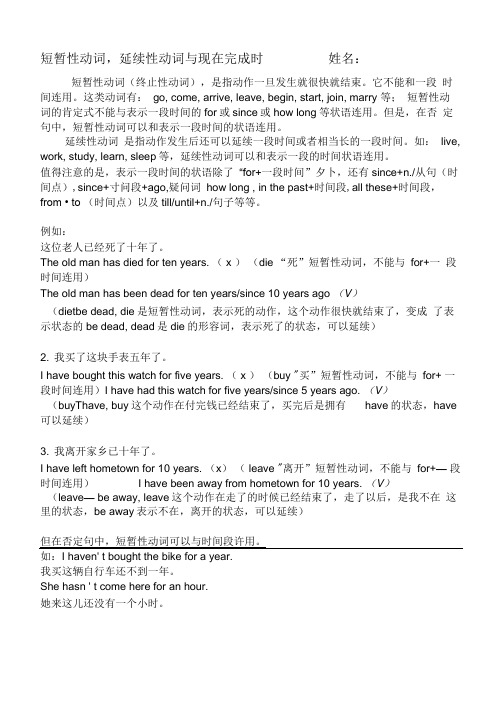
短暂性动词,延续性动词与现在完成时姓名:短暂性动词(终止性动词),是指动作一旦发生就很快就结束。
它不能和一段时间连用。
这类动词有:go, come, arrive, leave, begin, start, join, marry 等;短暂性动词的肯定式不能与表示一段时间的for或since或how long等状语连用。
但是,在否定句中,短暂性动词可以和表示一段时间的状语连用。
延续性动词是指动作发生后还可以延续一段时间或者相当长的一段时间。
如:live, work, study, learn, sleep等,延续性动词可以和表示一段的时间状语连用。
值得注意的是,表示一段时间的状语除了“for+一段时间”夕卜,还有since+n./从句(时间点),since+寸问段+ago,疑问词how long , in the past+时间段,all these+时间段,from • to (时间点)以及till/until+n./句子等等。
例如:这位老人已经死了十年了。
The old man has died for ten years. ( x )(die “死”短暂性动词,不能与for+一段时间连用)The old man has been dead for ten years/since 10 years ago (V)(dietbe dead, die是短暂性动词,表示死的动作,这个动作很快就结束了,变成了表示状态的be dead, dead是die的形容词,表示死了的状态,可以延续)2. 我买了这块手表五年了。
I have bought this watch for five years. ( x )(buy "买”短暂性动词,不能与for+ 一段时间连用)I have had this watch for five years/since 5 years ago. (V)(buyThave, buy这个动作在付完钱已经结束了,买完后是拥有have的状态,have 可以延续)3. 我离开家乡已十年了。
- 1、下载文档前请自行甄别文档内容的完整性,平台不提供额外的编辑、内容补充、找答案等附加服务。
- 2、"仅部分预览"的文档,不可在线预览部分如存在完整性等问题,可反馈申请退款(可完整预览的文档不适用该条件!)。
- 3、如文档侵犯您的权益,请联系客服反馈,我们会尽快为您处理(人工客服工作时间:9:00-18:30)。
短暂性动词与延续性动词相互转换对应表
语法讲解:
1.现在完成时表示过去发生的某一动作或存在的状态,一直持续到现在,并可以和以for或since引导的表示一段时间的状语连用,也可以用在以“how long”提问的句子中,句子中的谓语动词一般为延续性动词。
例:
He has been away from Beijing for two years. = He left Beijing two years ago.
When did the train arrive here? B. How long ____ the train ____ here?
2.在现在完成时的肯定句中,非延续性动词作谓语动词时,不能和表示一段时间的状语连用。
但可以用其他句式来表示同一个意思。
例:
Lucy has come back.
The old man died 4 years ago. =
The old man has been dead for 4 years.
He has been away from Beijing for two years.
= He left Beijing two years ago.
= It is two years since he left Beijing.
= Two years has passed since he left Beijing.
3.非延续性动词可以在现在完成时的否定句中作谓语,并可以与for,since引导的时间状语连用,表示动作的延续过程。
例如:
She hasn’t bought any new clothes since last year.
I haven’t borrowed the book for a long time.
巩固习题:
1. When he arrived at the bus stop, the bus ________ f or 20 minutes.
A. has left
B. had left
C. has been away
D. had been away
2. I ______ the League for 5 years so far.
A. joined
B. have joined
C. have been in
3. The factory ________ since the February of 1988.
A . has been open B. has opened C. was open D. opened
4. Mary and Rose _______friends since they met in 2000.
A. have made
B. have been
C. made
D. have become
meeting _______ for a week now.
A. has finished
B. has ended
C. has been over
Gao ______ this school for nearly 5 years.
A. has been in
B. has come to
C. has taught
______ a teacher for 4 years .
A. has been
B. has become
C. was
D. became
8. I ______ home for a week.
A. have returned
B. have been back
C. returned
9. How long _______ he ________ ?
A. died
B. has, died
C. has, been dead
10. ----- How long can I ______ the book? ------ Two weeks.
A. borrow
B. lend
C. get
D. keep
________ the car for a week.
A. bought
B. has bought
C. has had
long _____ you _____ ill ? -----Two weeks.
A. did fall
B. have, fell
C. have, been
2000, he _____ his hometown.
A. has left
B. has moved away
C. has been away fro
m
'll lend you the book , but you can only _____ it for 2 days.
A. borrow
B. keep
C. take
bus ______ on the road for 2 hours so far.
A. has stopped
B. stopped
C. has been
16. Tom is ill in hospital. He _______ a cold for several days.
A. is
B. catches
C. has caught
D. has ha d
________ for 2 hours.
A. got up
B. has got up
C. has been up。
